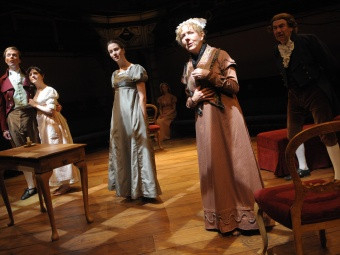Middlemarch – Fred & Mary

Over three plays and nearly nine hours of playing, the Orange Tree has now completed its quick and lucid Middlemarch cycle, adapted and directed from George Eliot’s great novel by Geoffrey Beevers; it plays in repertory (with a few “all-day” performances) right through the holiday season to February.
In unravelling three or four of the major narrative strands, Beevers sacrifices an accumulative density of purpose and effect in Eliot’s scheme, but he’s extremely good at arranging clusters of story line into a dramatic and entertaining scenography.
In the first play, for instance, Dorothea’s Story, we experience the exact moment when Georgina Strawson’s luminous heroine falls in love with Ben Lambert’s attractive Will Ladislaw on her honeymoon in Rome. And in the second, The Doctor’s Story, there’s an electrifying broadside against the institutionalisation of marriage as Lydgate (David Ricardo-Pierce) and Niamh Walsh’s flirtatious Rosamond Vincy run out of patience with each other.
The broadside, of course, emanates from Dorothea, who comes steaming back into the adaptation at that point, settling into a more sedate and secondary role in the third play, Fred & Mary. These two, Fred Vincy (Ben Lambert) and Mary Garth (Daisy Ashford, Dorothea’s sister, Celia, in the first play) are childhood sweethearts but there is a condition of career compromise attached, too.
This forging of relationships within a community as the world changes quietly around them – in medicine, in politics, on the railway, on the land – is a distinctive feature of novel and play, and Eliot’s study of provincial life moves inexorably towards the wise and unarguable conclusion that “the growing good of the world is partly dependent on unhistoric acts”.
And you get this feeling in the wit and humanity of the Orange Tree performances, even in that of Christopher Ettridge’s portrait across all three plays of Bulstrode, the philanthropic financier whose murky past comes back to haunt him; or in the three sharply edged vignettes of Liz Crowther; or in Christopher Naylor’s delightful pairing of a jovial baboon, Ned Plymdale, and the kindly vicar Farebrother who carries a torch across two plays for Mary Garth.
Jamie Newall starts strongly as the dry as dust scholarly Casaubon in the first play and settles comfortably into the self-made landowner Featherstone, while Lucy Tregear comes storming up on the outside as two pointedly different maternal figures, Mrs Vincy and Mary’s mother. Michael Lumsden glowers early on as Raffles the blackmailer (in Bulstrode’s back story) and beams more virtuously as Walter Vincy, Fred’s father, a successful manufacturer and the Mayor of Middlemarch.
Each play, especially the first two, can be enjoyed on its own, but if you bother with one you will probably want to go back for the others. It all makes for an enriching seasonal treat, and an unusual one. Well, it’s not a pantomime… oh no it isn’t.










